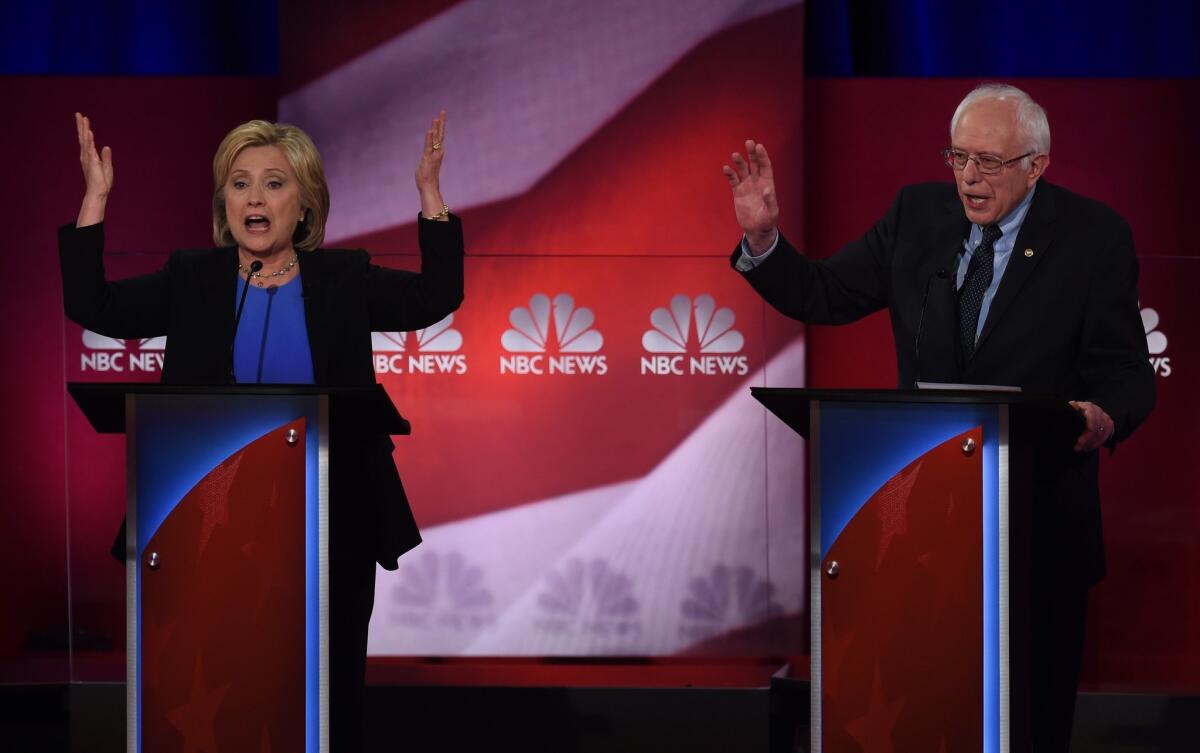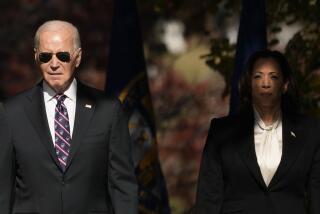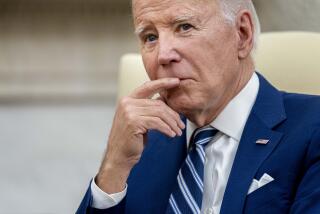Column: Democrats must decide between a revolutionary and a pragmatist

Democratic presidential candidates Hillary Clinton and Bernie Sanders debate in Charleston, S.C., on Jan. 17.
As their party’s caucuses and primaries get underway, Democrats face as stark a choice as any in modern times. They must decide between a revolutionary and an incrementalist: Bernie Sanders, a democratic socialist who wants to transform the political system, and Hillary Clinton, a more cautious, conventional — you might even say Clintonian — liberal.
For some voters, what matters most is ideology: What kind of progressive agenda do they prefer? For others, it’s electability — although that’s notoriously hard to predict before people actually start casting ballots.
But there’s another factor Democrats ought to consider: governability. How would President Sanders get his revolutionary agenda through a Congress in which at least one house will still be run by a counterrevolutionary Republican majority?
For progressives, Sanders is the political equivalent of a Powerball ticket: the payoff is huge, but there’s only a small chance of winning.
Take the issue on which the two candidates diverge most sharply: healthcare reform.
Sanders has an ambitious proposal for a European-style, government-run health insurance system (known to policy wonks as “single payer”). Clinton, meanwhile, merely aims to make the Affordable Care Act, based on private insurance plans, work a little better.
Abstractly, that’s an easy choice for most liberals and progressives (not to mention socialists): Most of them prefer single payer. A well-designed government-run system works better and far more cheaply than our crazy patchwork of public and private plans, as Sweden and other countries with single-payer systems have shown.
But as Clinton reminded voters during the Democratic debate on Sunday, President Obama’s not-very-revolutionary healthcare law barely squeaked through to passage in 2010.
“There was an opportunity to vote for what was called the public option,” she noted — a government-run plan that wasn’t even as ambitious as single payer. “And even when the Democrats were in charge of the Congress, we couldn’t get the votes for that.”
In other words: You can’t get there from here.
Clinton is probably right. A Kaiser Family Foundation poll last year found that only 26% of Americans want to expand Obamacare — mostly Democrats. A far larger number, 42%, want to scale the plan back or scrap it entirely. (Most of those are non-Democrats, but once the question is before Congress, their preference matters too.)
Besides, Sanders hasn’t even begun to sell single payer to the American public — unless you count giving his plan the comforting title “Medicare for All.”
Almost nine months after he announced his candidacy, he still hasn’t produced a full description of how his proposal would work. He released an eight-page summary before Sunday’s debate, but it focused on how he would pay for the plan (new taxes, mostly on the wealthy), not how it would actually deliver care.
This notable lack of detail extends to other parts of Sanders’s agenda too, including his proposals for free tuition at public universities and breaking up the nation’s biggest banks.
How does Sanders intend to enact his audacious program? He says the answer is simple: He’ll build a grass-roots movement so powerful that voters will sweep the GOP out of power.
“Nothing real will happen unless we have a political revolution where millions of people finally stand up,” he said Sunday. “What we’ve got to do is create a political revolution which revitalizes American democracy, which brings millions of young people and working people into the political process.”
That’s easier said than done, of course.
Barack Obama tried to turn his huge 2008 electoral majority into a grass-roots movement called Organizing for America and failed miserably. If Sanders doesn’t win an ever larger majority than Obama, his administration would encounter — or, perhaps, engender — four years of continued gridlock.
Clinton had a different answer on Sunday to the question of how she would govern.
“I will go anywhere, to meet with anyone, any time, to find common ground. That’s what I did as first lady, when I worked with both Democrats and Republicans … and it’s what I did as secretary of State.”
In other words: Come, let us reason together. Yes, that’s essentially what Obama tried to do — with little success once Republicans held the majority. Clinton is arguing, in effect, that she could do better, because she has a longer bipartisan track record.
For progressives, Sanders is the political equivalent of a Powerball ticket: The payoff is huge, but there’s only a small chance of winning. (For Sanders, remember, the revolution requires not only the presidency, but Congress too.) Clinton is more like a money market fund: not very inspiring, but you’re less likely to lose the grocery money.
Like Obama in 2008, Sanders is saying: Yes, we can. Clinton is saying: No, we can’t — not all of it, anyway.
Twitter: @doylemcmanus
Follow the Opinion section on Twitter @latimesopinion and Facebook
More to Read
A cure for the common opinion
Get thought-provoking perspectives with our weekly newsletter.
You may occasionally receive promotional content from the Los Angeles Times.







